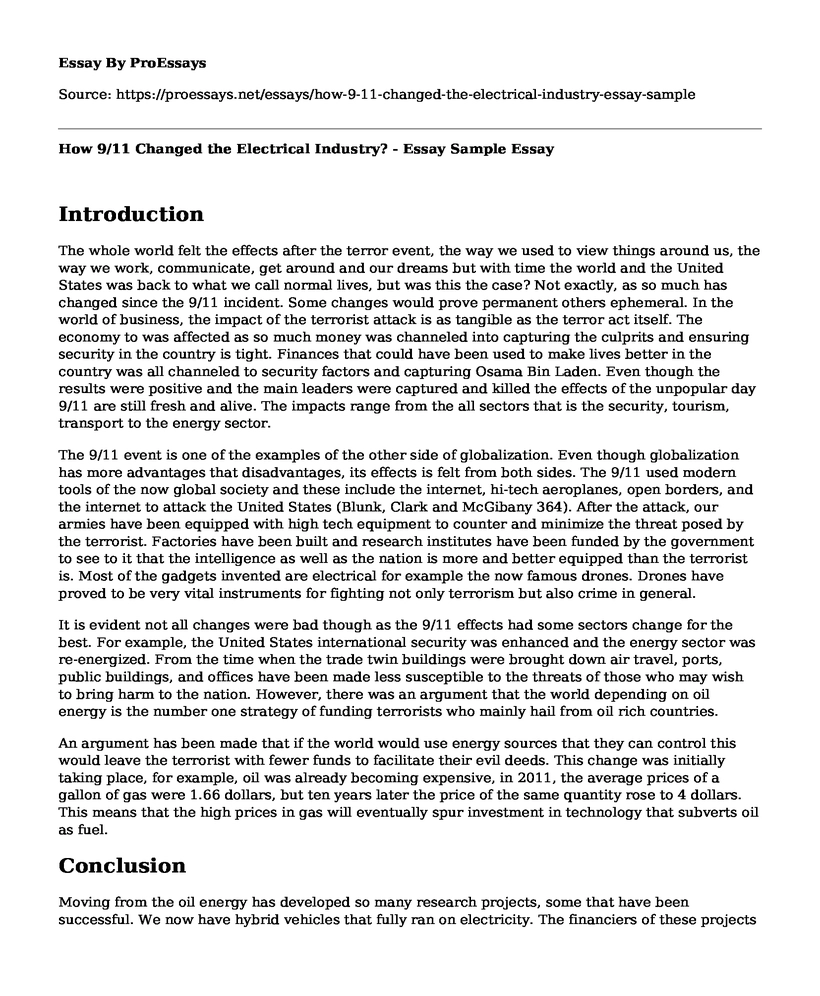Introduction
The whole world felt the effects after the terror event, the way we used to view things around us, the way we work, communicate, get around and our dreams but with time the world and the United States was back to what we call normal lives, but was this the case? Not exactly, as so much has changed since the 9/11 incident. Some changes would prove permanent others ephemeral. In the world of business, the impact of the terrorist attack is as tangible as the terror act itself. The economy to was affected as so much money was channeled into capturing the culprits and ensuring security in the country is tight. Finances that could have been used to make lives better in the country was all channeled to security factors and capturing Osama Bin Laden. Even though the results were positive and the main leaders were captured and killed the effects of the unpopular day 9/11 are still fresh and alive. The impacts range from the all sectors that is the security, tourism, transport to the energy sector.
The 9/11 event is one of the examples of the other side of globalization. Even though globalization has more advantages that disadvantages, its effects is felt from both sides. The 9/11 used modern tools of the now global society and these include the internet, hi-tech aeroplanes, open borders, and the internet to attack the United States (Blunk, Clark and McGibany 364). After the attack, our armies have been equipped with high tech equipment to counter and minimize the threat posed by the terrorist. Factories have been built and research institutes have been funded by the government to see to it that the intelligence as well as the nation is more and better equipped than the terrorist is. Most of the gadgets invented are electrical for example the now famous drones. Drones have proved to be very vital instruments for fighting not only terrorism but also crime in general.
It is evident not all changes were bad though as the 9/11 effects had some sectors change for the best. For example, the United States international security was enhanced and the energy sector was re-energized. From the time when the trade twin buildings were brought down air travel, ports, public buildings, and offices have been made less susceptible to the threats of those who may wish to bring harm to the nation. However, there was an argument that the world depending on oil energy is the number one strategy of funding terrorists who mainly hail from oil rich countries.
An argument has been made that if the world would use energy sources that they can control this would leave the terrorist with fewer funds to facilitate their evil deeds. This change was initially taking place, for example, oil was already becoming expensive, in 2011, the average prices of a gallon of gas were 1.66 dollars, but ten years later the price of the same quantity rose to 4 dollars. This means that the high prices in gas will eventually spur investment in technology that subverts oil as fuel.
Conclusion
Moving from the oil energy has developed so many research projects, some that have been successful. We now have hybrid vehicles that fully ran on electricity. The financiers of these projects have no hopes on wind farms, biofuel and solar as these sources widely depend on oil too and the moment these projects increase then prices of oil goes up again. In support of other sources of energy, the government has reduced the taxes of all the electric cars in America to encourage more purchases (Bradley and Frank 117). There is a threat that is associated with nuclear energy where people have argued that if the planes were directed to the nuclear plants in the U.S the effects would have been more devastating than what we witnessed with the trade towers. This means people have more support in another source of energy; this will promote the support and use of electricity and hence electrical gadgets and a world dependent on electricity.
Works Cited
Bradley, Thomas H., and Andrew A. Frank. "Design, demonstrations and sustainability impact assessments for plug-in hybrid electric vehicles." Renewable and Sustainable Energy Reviews 13.1 (2009): 115-128.
Blunk, Scott S., David E. Clark, and James M. McGibany. "Evaluating the long-run impacts of the 9/11 terrorist attacks on US domestic airline travel." Applied economics 38.4 (2006): 363-370.
Cite this page
How 9/11 Changed the Electrical Industry? - Essay Sample. (2022, Jun 02). Retrieved from https://proessays.net/essays/how-9-11-changed-the-electrical-industry-essay-sample
If you are the original author of this essay and no longer wish to have it published on the ProEssays website, please click below to request its removal:
- Vietnamese Services During the Japan and France Conflict
- Political Impact of Cold War Essay
- Religion, Morals, and Slavery Essay
- Essay Sample on Lyndon B. Johnson & Cold War: Vietnam War & US Foreign Policy
- The Future of Transportation: Electric Vehicle Revolution - Essay Sample
- 2020 Campaign: Exploiting Partisan Divide to Create Division - Free Paper Sample
- Paper Sample on Thomas Graham: Pioneer in Chemistry and the Father of Diffusion Studies







